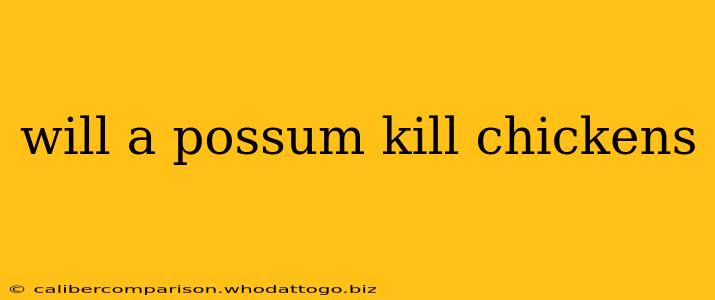Will a Possum Kill Chickens? A Comprehensive Look at Possum Predation
The question of whether possums kill chickens is a common one among poultry keepers. The short answer is: yes, possums can kill chickens, although it's not their primary food source and it's not something that happens frequently. Understanding the circumstances under which this might occur is crucial for protecting your flock.
Understanding Possum Behavior and Diet
Possums, also known as opossums, are generally opportunistic omnivores. Their diet is incredibly varied, including fruits, vegetables, insects, rodents, and even carrion. While they aren't natural predators of chickens in the same way a fox or hawk might be, they are capable of killing and eating them, especially under certain conditions.
When Possums Pose a Threat to Chickens
Several factors increase the likelihood of a possum attacking your chickens:
- Easy Access: If your chicken coop or run has inadequate security, possums can easily gain entry. Poorly maintained fencing, gaps in the coop structure, or unsecured doors provide ideal access points.
- Food Availability: A possum might target chickens if other food sources are scarce. This is particularly true during harsh winters or periods of drought when natural food is less readily available.
- Young or Weak Chickens: Possums are more likely to prey on younger, smaller, or weaker chickens that are easier to catch and subdue. Sick or injured chickens are also at higher risk.
- Opportunity: A possum might stumble upon a chicken that has wandered away from the flock or is sleeping outside the coop. This presents an unexpected opportunity for an opportunistic meal.
Signs of Possum Predation
If you suspect a possum has attacked your chickens, look for these signs:
- Missing Chickens: The most obvious sign is the disappearance of one or more chickens.
- Damage to the Coop: Look for signs of forced entry, such as damaged fencing, broken latches, or holes in the coop walls.
- Feathers or Blood: Scattered feathers or bloodstains near the coop can indicate a struggle.
- Partial Carcasses: Possums might not always consume the entire chicken, leaving behind parts of the carcass.
- Possum Tracks: Look for possum tracks around your coop. They are usually five-toed and leave a distinct pattern in soft ground.
Protecting Your Chickens from Possums
Taking preventative measures is the best way to protect your chickens from possum predation:
- Secure the Coop: Ensure your coop is completely secure with strong, sturdy fencing, well-fitted doors, and no gaps or holes. Bury wire mesh a few inches below ground level to prevent digging.
- Improve Nighttime Security: Possums are most active at night. Consider using predator-proof netting over the run or installing automatic lighting to deter them.
- Eliminate Food Sources: Remove any potential attractants, such as fallen fruit or pet food, from around the coop.
- Regular Inspection: Regularly inspect your coop and run for any signs of damage or potential entry points.
Conclusion
While possums are not the most common predators of chickens, they can pose a threat under certain conditions. By understanding possum behavior and taking proactive steps to secure your coop and protect your flock, you can significantly reduce the risk of losing chickens to these opportunistic animals. Remember, proactive measures are key to maintaining a safe and healthy environment for your chickens.

